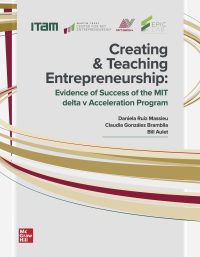Our 2021 cohort was the 10th overall to take part in the Trust Center’s educational accelerator, making it the perfect time to conduct an in-depth longitudinal study of the impact of delta v on our students, their startups, and the overall and economic impact the program has had.
Tremendous gratitude to Professor Daniela Ruiz Massieu, Managing Director of the Instituto Tecnologico Autonomo de Mexico (ITAM) Entrepreneurship and Innovation Center, for leading nearly a full year of research in 2022 along with her collaborator from ITAM, Professor Claudia Gonzalez-Brambila.
Summary of conclusions:
- Ventures Derived from Program Have Been Very Successful by Traditional Metrics:
The explicit primary goal of the delta v program is educational in nature and specifically to create more, higher quality and better connected entrepreneurs, which creates a more fundamental and nuanced goal than traditional metrics are designed to capture. That being said the results generated by the ventures started by these entrepreneurs in delta v are extraordinary as measured by conventional benchmarks.- Survival Rate: Since its inception, 61% of delta v projects have become real companies that either continue to exist to this day or have been acquired. If you look at the companies from the past five years, that number increases to 69%.
- Attractiveness to Investors: 63% of all the projects have resulted in companies that raised money.
- Magnitude of Funding Attracted: The companies that have raised to date have totaled over $1 billion to date and that continues to grow.
- Alignment with MIT’s Mission of Principled Entrepreneurship Is Very Strong:
89% are aligned with the United Nations Sustainable Development Goals. - Participants Go On to Found Other Companies at a Prolific Rate:
Over 130 new additional companies that have raised an additional $2 billion beyond the companies started from the projects worked on in delta v. - Diversity Has Been at the Core of delta v from the Beginning and, as a Result, It Has Grown Over Time:
Representative of this is the Percentage of Teams with a Woman CEO- First Five Year Average: 23%
- Second Five Year Average: 39%
- 2022 Cohort (n=1 so statistically less robust): 55%
- delta v Has Built a Connected Community:
83% of survey respondents say they are still in touch with their cohort - Participants and Teams Connected Extremely Well to Broader Communities Internally as Well as Externally to MIT:
68 (37.5% of the pool) were accepted into external, private/for-profit accelerators, led by Y Combinator, TechStars, and Mass Challenge. - Participants Are Extremely Satisfied Quantitatively and Qualitatively:
Based on the survey results, the average Net Promoter Score (NPS), is 69 across all cohorts, which is excellent in the service industry. From a qualitative standpoint, the most common feedback we got was “it changed my life.”
These conclusions do not mean the program is perfect, far from it, and our research identified in an evidence-based manner areas to be improved with regard to the content (e.g., financial literacy and fundraising, marketing, human resources, product development) as well as ways to improve the connectivity of the community, which is the unsung hero and benefit of delta v.



Follow